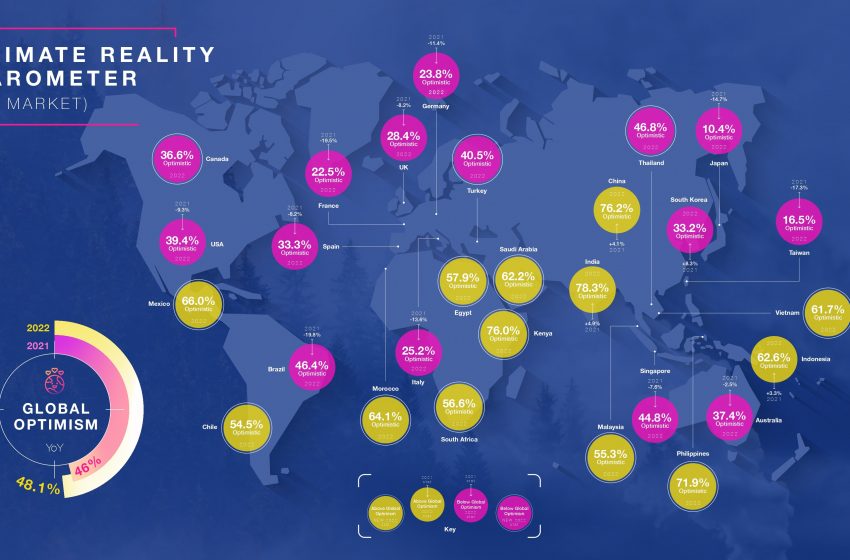
Epson’s Research Shows Kenyans Amongst The Most Optimistic About Overcoming Climate Change
Global Technology Company, Epson’s second Climate Reality Barometer published recently presents fascinating insights into how attitudes are (and are not) changing as the climate crisis unfolds.
The Research shows that people see climate change as a primary threat – on a par with the ongoing financial crisis
The survey conducted across 28 markets on 26,205 people suggests that despite increasing climate impacts, climate optimism has grown to over 48%.
“Globally, respondents from Kenya are amongst the most optimistic (76.0%) that we will avert a climate disaster in their lifetime, with only 13.1% pessimistic that we will avert a climate disaster in their lifetime. Those aged 25-34 are the most optimistic (80.5%), and those aged 16-24 are the least optimistic (67.7%)”, the survey states.
The 2022 Epson Climate Reality Barometer in Kenya found that almost half (48.4%) of the people surveyed believe ‘fixing the economy’ is the most urgent issue that the government administration and companies should be focusing on, followed by climate change (20.0%).
More respondents aged 35-44 (26.6%) consider climate change a government priority than other age groups (16-24 = 16.8%).
Epson Global President Yasunori Ogawa commented: “Epson’s corporate purpose is focused on improving lives and the planet, and we will devote significant resources to achieve this. As the world gathers for COP27, our Climate Reality Barometer aims to raise awareness and empower transformational change.
“We hope that the Barometer’s insights will help governments, industries and individuals to step up their efforts to avert climate disaster. While we know there is a long way to go, we believe we can build a better future if we work together and act now.”
The Kenyan government has no alternative but to lead by example as most people are already stepping up measures to mitigate the climate emergency. These include reducing plastic use (74.6%); using more reusable goods (74.6%) and walking or cycling more often (73.0%).
Despite these commendable efforts, there are still a number of gaps in terms of what people are willing to do, which will be important in reaching net zero targets at a global and national level. Only 5.4% have switched to an electric vehicle, though promisingly 75% are planning to do this in the future, and only a quarter (26%) travel to the office less, however 50% are planning to do so in the future.
“For those who have taken up actions to mitigate the impacts of climate change, a number of them are consistently committed to these actions. Almost half (48.6%) have tried reducing plastic use for longer than a year and still do this, while 46.8% have tried recycling for longer than a year and continue to do so and 44.6% have walked or cycled more often for longer than a year and continue to do so”, the survey adds.
Findings show that awareness is growing – but slowly and inconsistently. While the ‘climate reality deficit’ identified in the first Barometer published last year stubbornly persists, the data also suggests that it is narrowing, and that people are doing more to tackle the crisis.
According to the survey, the key drivers of change in Kenya include Government policy changes (63.1%); witnessing the impacts of climate change (52.6%) and company or community sustainability programmes (41.1%).
“While individual actions are ramping up, it’s clear that much more needs to be done. Governments need to regulate for sustainability, businesses need to develop sustainable policies and technologies, and individuals need accelerate lifestyle changes – if the world is to meet its climate change targets and avoid irreversible change” commented Mukesh Bector – Regional Head East and West Africa at Epson.
The 2022 Epson Climate Reality Barometer shows progress – but also that short-term economic demands are in danger of distracting the government, businesses and individuals from imperative environmental action. The government needs to keep its focus and ensure decisive, rapid and effective responses to the ongoing climate emergency. Epson believes building a better future calls for collaborative efforts in the form of public-private partnerships to fight climate change.


![Phishing and scams have increased in Africa. [Photo - Courtesy]](https://techtalk.africa/wp-content/uploads/2022/08/Phishing.jpg)
![Kaspersky researchers have found a new malicious campaign that developers need to be ware of. [Photo - Courtesy]](https://techtalk.africa/wp-content/uploads/2022/08/Kaspersky.jpg)
![LightWays is a fully enclosed, flexible ducting system ideal for protecting, segregating and managing fibre optic cables in the data centre environment. [Photo - Courtesy]](https://techtalk.africa/wp-content/uploads/2022/08/Siemon_LightWays.jpg)



